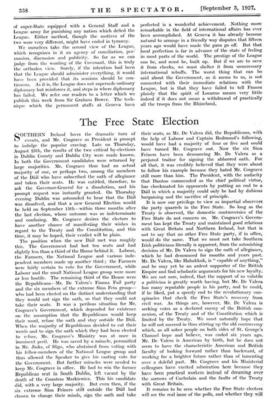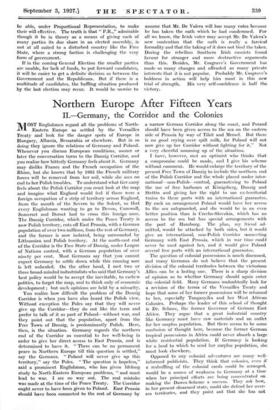The Free State Election
SOUTHERN Ireland loves the dramatic turn of events, and Mr. Cosgrave as President is prompt to indulge the popular craving. Late on Thursday, August 25th, the results of the two critical by-elections in Dublin County and Dublin City were made known.
In both the Government candidates were returned by large majorities. Mr. Cosgrave thus had an actual majority of one, or perhaps two, among the members of the Dail who have subscribed the oath of allegiance and taken their seats. He was entitled, therefore, to ask the Governor-General for a dissolution, and his prompt request was instantly granted. On Thursday evening Dublin was astounded to hear that the Dail was dissolved, and that a new General Election would be held on September 15th—within three months after the last election, whose outcome was so indeterminate and confusing. Mr. Cosgrave desires the electors to have another chance of manifesting their wishes in regard to the Treaty and the Constitution, and this time, it may be hoped, their verdict will be plain.
The position when the new Dail met was roughly this. The Government had lost ten seats and had slightly less than a third of the House behind it. Labour, the Farmers, the National League and various inde- pendent members made up another third ; the Farmers were fairly certain to vote for the Government, while Labour and the small National League group were more or less hostile. The remaining third of the House were the Republicans—Mr. De Valera's Fianna Fail party and the six members of the extreme Sinn Fein group— who had been elected on the distinct understanding that they would not sign the oath, so that they could not take their seats. It was a perilous situation for Mr. Cosgrave's Government, which depended for existence on the assumption that the Republicans would keep their word, refuse the oath and stay outside the Dail. When the majority of Republicans decided to eat their words and to sign the oath which they had been elected to refuse, Mr. Cosgrave's Ministry was at once in imminent peril. He was saved by a miracle, personified in Mr. Jinks, of Sligo, who abstained from voting with his fellow-members of the National League group and thus allowed the Speaker to give his casting vote for the Government. But further miracles were needed to keep Mr. Cosgrave in office. He had to win the former Republican seat in South Dublin, left vacant by the death of the Countess Markiewicz. This his candidate did, with a very large majority. But even then, if the six extreme Sinn Feiners still outside the Dail had chosen to change their minds, sign the oath and take their seats, as Mr. De Valera did, the Republicans, with the help of Labour and Captain Redmond's following, would have had a majority of four or five and could have turned Mr. Cosgrave out. Now the six Sinn Feiners have been denouncing Mr. De Valera as a perjured traitor for signing the abhorred oath. For all that, it was credibly believed that they were about to follow his example because they hated Mr. Cosgrave still more than him. The President, with the audacity that Danton commended as the chief political virtue, has checkmated his opponents by putting an end to a Dail in which a majority could only be had by dubious bargaining and the sacrifice of principle.
It is now our privilege to view as impartial observers the party quarrels in the Free State. So long as the Treaty is observed, the domestic controversies of the Free State do not concern us. Mr. Cosgrave's Govern- ment has kept the Treaty and maintained good relations with Great Britain and Northern Ireland, but that is not to say that no other Free State party, if in office, would do the same. That we must not take Southern Irish politicians literally is apparent, from the astonishing decision of Mr. De Valera to sign the oath of allegiance, which he had denounced for months and years past. Mr. De Valera, like Habakkuk, is " capable of anything," and he may yet be an ardent supporter of the British Empire and find scholastic arguments for his new loyalty. We are not sure, indeed, that the support of so volatile a politician is greatly worth having, but Mr. De Valera has many reputable people in his party, and he could, if he liked, put a speedy end to the revolutionary con- spiracies that check the Free State's recovery from civil war. As things are, however, Mr. De Valera is seeking votes as a declared enemy of the British con- nexion, of the Treaty and of the Constitution which is limited by the Treaty. We must naturally hope that he will not succeed in thus stirring up the old controversy which, as all sober people on both sides of St. George's Channel hope and believe, was ended six years ago. Mr. De Valera is American by birth, but he does not seem to have the characteristic American and British faculty of looking forward rather than backward, of working for a brighter future rather than of lamenting over a doleful past. Mr. Cosgrave and his Ministerial colleagues have excited admiration here because they have been practical workers instead of dreaming over the sorrows of Cuchulain and the faults of the Treaty with Great Britain.
It remains to be seen whether the Free State electors will see the real issue of the polls, and whether they will be able, under Proportional Representation, to make their will effective. The truth is that " P.R.," admirable though it be in theory as a means of giving each of many parties its due share in an elected assembly, is not at all suited to a disturbed country like the Free State, where a strong faction is challenging the very form of government.
If in the coming General Election the smaller parties are unable, for lack of funds, to put forward candidates, it will be easier to get a definite decision as between the Government and the Republicans. But if there is a multitude of candidates, the baffling situation produced by the last election may recur. It would be unwise to assume that Mr. De Valera will lose many votes because he has taken the oath which he had condemned. For all we know, the Irish voter may accept Mr. De Valera's new contention that the oath is really a farcical formality and that the taking of it does not bind the taker. During the rebellion Southern Irish casuists found favour for stranger and more destructive arguments than this. Besides, Mr. Cosgrave's Government has made so many changes and offended so many private interests that it is not popular. Probably Mr. Cosgrave's boldness in action will help him most in this new trial of strength. His very self-confidence is half the victory.











































 Previous page
Previous page